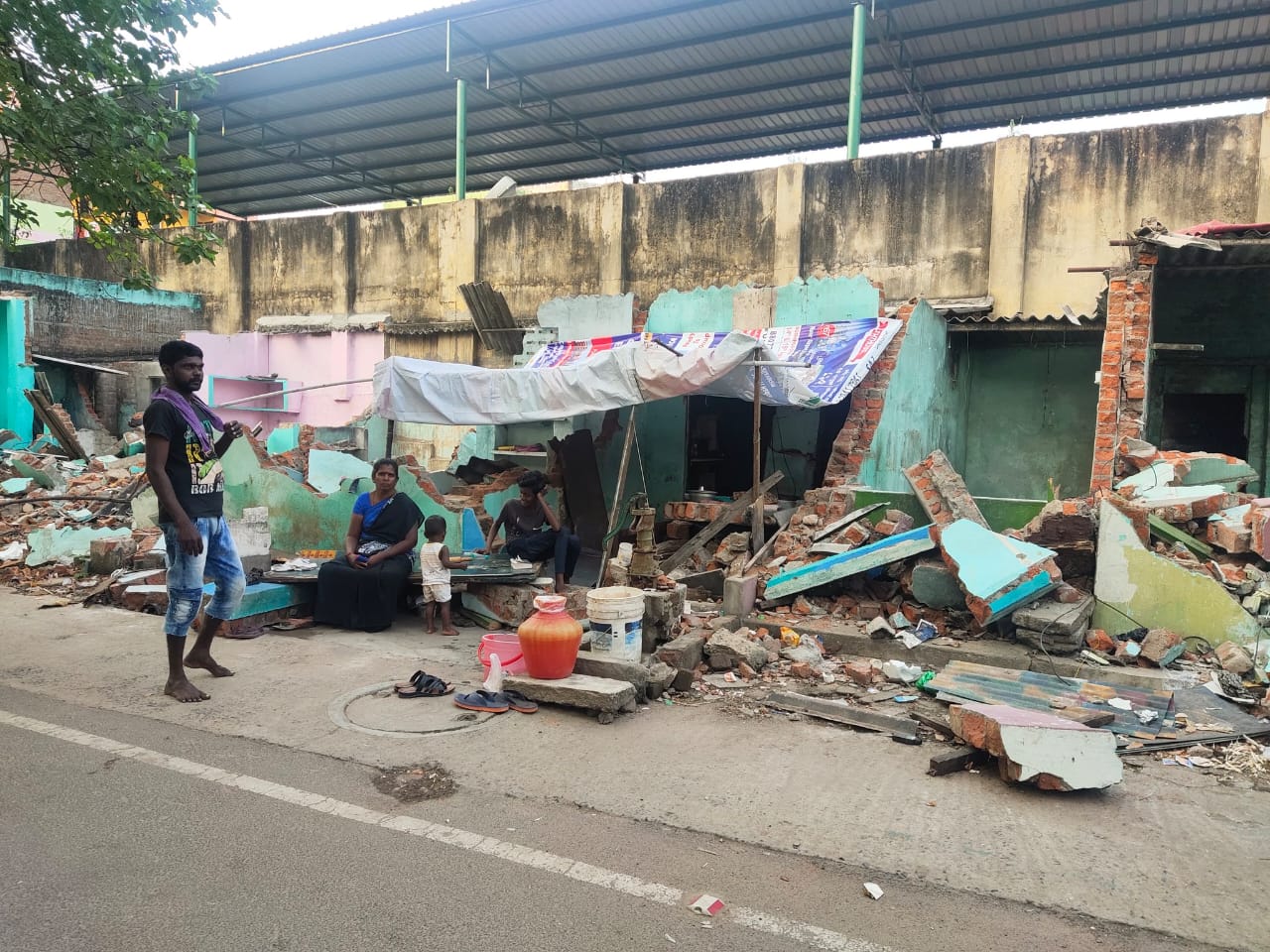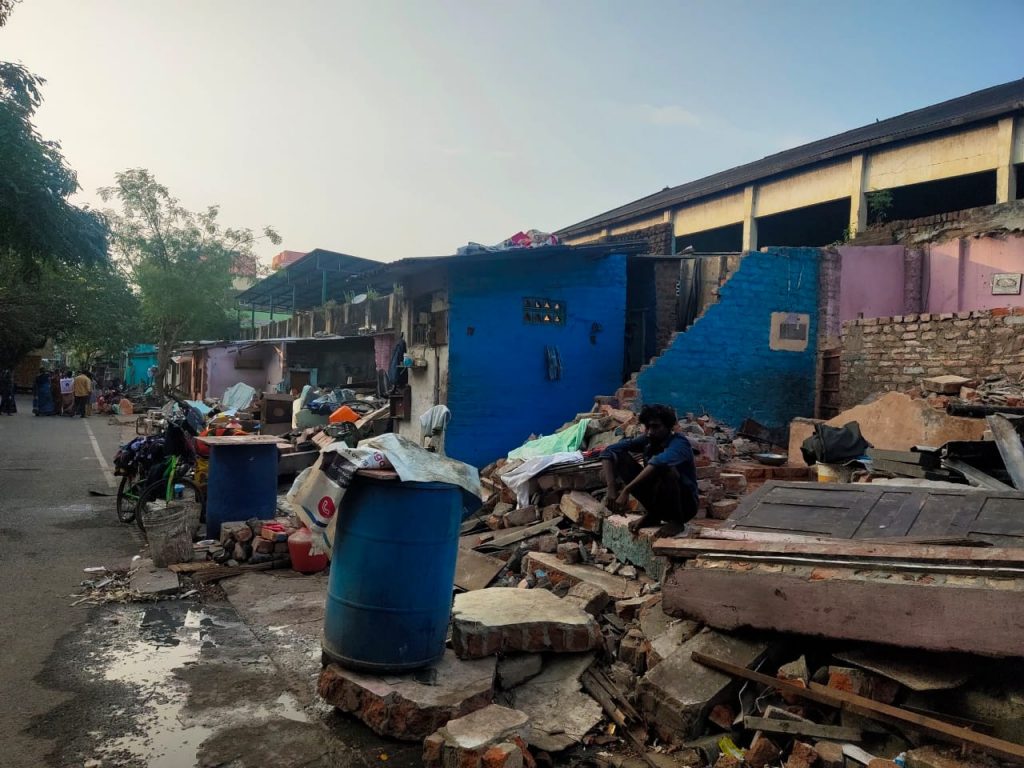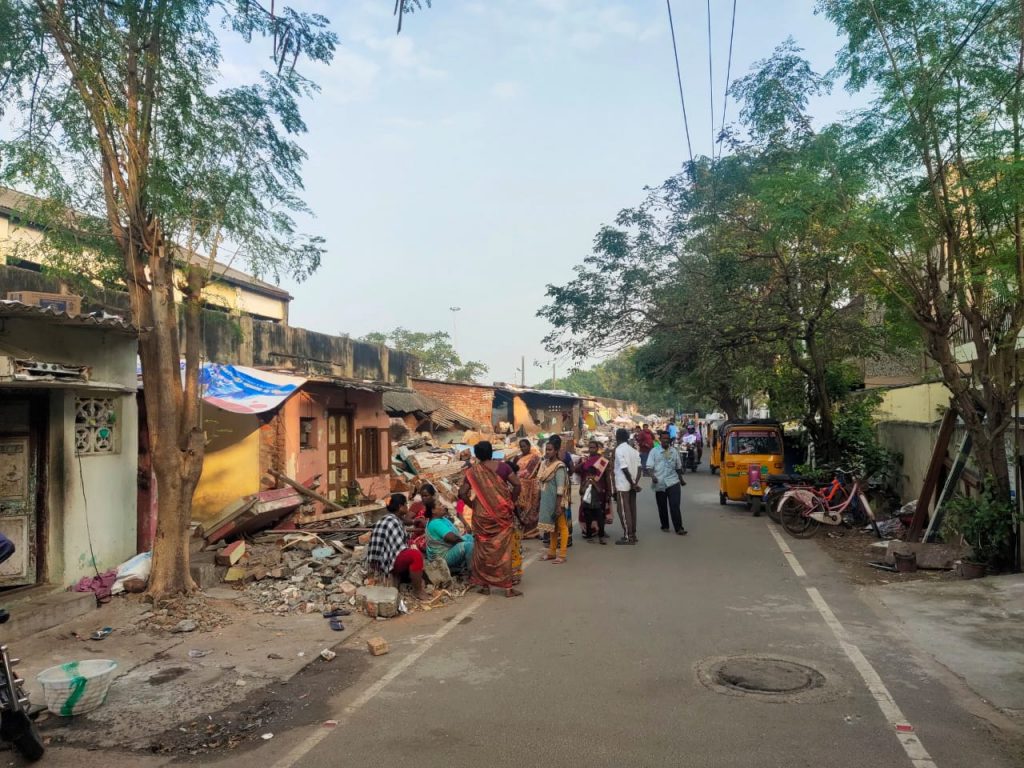“Aren’t we human?,” ask Dalit families after demolition of their settlement in Chennai street, fear loss of livelihood

Nearly seventy-seven Dalit families in Thangavelu Street, T. Nagar, Chennai in the southern Indian state of Tamil Nadu are stranded in the streets after the city corporation demolished their houses on 2 January. The families have condemned the demolition and demanded to be relocated within 8 kilometers of the settlement in order to not lose their livelihood, reports Shalini S.
By Shalini S, TwoCircles.net
Chennai: Nearly seventy-seven Dalit families in Thangavelu Street, T. Nagar, Chennai in the southern Indian state of Tamil Nadu are stranded in the streets after the city corporation demolished their houses on 2 January. The Dalits families have condemned the demolition as being carried out to serve the interest of a ‘particular caste dominant individual.’
The All India Anna Dravida Munnetra Kazhagam (AIADMK), the ruling party and the opposition party Dravida Munnetra Kazhagam (DMK), have maintained silence about the demolition while the affected families are aghast.
Thangavelu Street is conspicuous in the now bristling T. Nagar locale, as the government ordered for relaxation following severe Covid-19 lockdown. While one side of the street is occupied by Dalits, whose cluster of houses have been smashed to bricks and stones – the other side is occupied by caste Hindus dwelling in luxurious apartments.
After the historic water crisis in Chennai during 2019, the state government had taken stringent measures to clear encroachments on water bodies, but the evacuation of Thangavelu Street’s Dalit settlement cannot be classified under the same, an elderly Dalit woman explains.
A case was filed against the Dalit occupants in 2002 by the caste Hindus alleging that the Dalits have encroached 30 feet of the public street apart from the poramboku land (land outside the revenue records) that they were settled in.
[caption id="attachment_440816" align="alignnone" width="696"] Thangavelu Street - Demolished Site[/caption]
Thangavelu Street - Demolished Site[/caption]
According to the affected families, the case is a history of the legal war between the Dalits and the caste Hindus.
However, Vincent, the late leader of the Dalit occupants had managed to chaperone the families through the legal process and as a result, they reconstructed their houses and ensured that the margins of the street is kept free from encroachment.
Talking to TwoCircles.net, an elderly resident said, “I still have a thousand rupees debt to pay from the construction work we did back then. I don’t even have a roof over my head now.”
The affected Dalits state that the case was revived again in 2016 ‘for the personal benefit of a particular individual and his family living on the privileged side of the same street in an apartment.’
“The people in that building want to sell their houses but no one would buy it because we live opposite to them. They can’t digest looking at our faces as the first thing when they pull out of their vehicles. Aren’t we humans? They would use this space for car parking rather us living here. Any man with a little bit of humanity left in his heart wouldn’t do it,” a Dalit resident told TwoCircles.net.
According to the Dalits, “the particular caste dominant individual with the help of other privileged members had agitated about the case solely for the purpose of parking their cars and putting their houses on sale.” For the Dalits, this ghettoization is an offshoot of neo-untouchability, reinforcing the ostracization of marginalized groups from the mainstream.
In August 2016, the Honorable Madras High Court had directed the District Collector to supervise whether or not the land is entitled to be occupied by the public. After a long pendency in this decision, the houses of the Dalits were demolished on 2 January 2021 with no prior notice and in the midst of a pandemic. The National Alliance of People’s Movement (NAPM), an alliance of progressive people’s organizations and movements in India, had pleaded the state to provide a moratorium until June 2021 but in vain.
The Dalits allege that the officials have been bribed into demolishing the houses since the police have expressed explicit soft corner for the particular privileged individual. “He (the privileged individual) would welcome police officers into his house for a feast. After leaving his house, the officers would treat us indifferently,” a Dalit resident said.
The Dalit occupants also emphasized that the corporation had no logical reason to demolish their houses as they have not encroached lands near water bodies. “In 2008, the DMK government regularized our settlement with water and electricity supplies only after clarifying it as unobjectionable encroachment. A grave injustice has been done to us in this lockdown,” another Dalit resident said.
In 2018, the AIADMK government announced a free housing Patta (ownership deed to a property) scheme in which Pattas were provided to those living in encroached lands for more than five years.
The residents of this settlement say that despite this scheme, their quest for claiming a housing Patta didn’t materialize. The families are residents of Thangavelu Street for the past fifty years but they could not claim a Patta because of the case filed against the settlement. The families expressed distress about society’s obliviousness to their grueling condition.
“Neelam Foundation thambis (younger brothers) helped us in staging a protest when our houses got demolished. They visited many officials but nothing seemed to work out, the police threatened to arrest them as it was a court order,” a resident said.
Neelam Foundation is an organization run by Pa. Ranjith. The foundation works closely with the marginalized communities.
The families are now resisting to shift to the reallocated place of Ezhilnagar, Thuraipakkam, as they maintain its not only far-off but is also “infamous for rape, murders, theft and other crimes.” Ezhilnagar is 25 kilometres away from their current residence and moving to this place will affect their livelihood and education. “My daughter cries every day. She would prefer to stay here in the streets than shift elsewhere,” a middle-aged woman said.
[caption id="attachment_440817" align="alignnone" width="696"] Thangavelu Street[/caption]
Thangavelu Street[/caption]
Another resident told TwoCircles.net, “I earn rupees 7000 per month and half of it goes into looking after my sick husband. I work at the houses of the nearby rich people and after work come rushing home to look after my husband. If we go to Ezhilnagar, I won’t have a job and I can’t travel that much distance every day. My body and soul are in pain. I almost went to immolate myself but people stopped me,” she said.
The Dalit residents swore not to cast any votes in the approaching Assembly Election as both the ruling and opposition parties have remained silent about their plight. Nevertheless, Dr Thirumavalavan, Member of Parliament and Chairman of Viduthalai Chiruthaigal Katchi (VCK) visited the settlement on 21 January and extended his solidarity. The party has also provided provisions for the families.
“Extending our solidarity, 10 Kg rice and other groceries were distributed,” Dr Thirumavalavan tweeted later.
The Dalits agree that they lack unity and don’t have any proper leadership. Despite this, they say, they have managed to create a middle ground and put up a legal battle by pooling in all of their resources. With a flickering ray of hope, they are positive to further their appeal with the help of a new lawyer.
As old women lie on tattered mats and chew betel leaves at the demolished site, the families are determined not to evacuate and demand a multi-storey building to be constructed on one corner of the street to occupy all the 77 families or to reallocate houses within the vicinity of 8 kilometers, close to their livelihoods.
“They would hurl casteist abuses at us and call us Parachi. We are not intimidated. They think we are meek but we will fight back,” a Dalit resident said.
